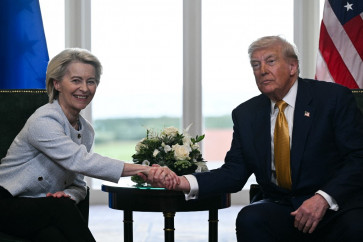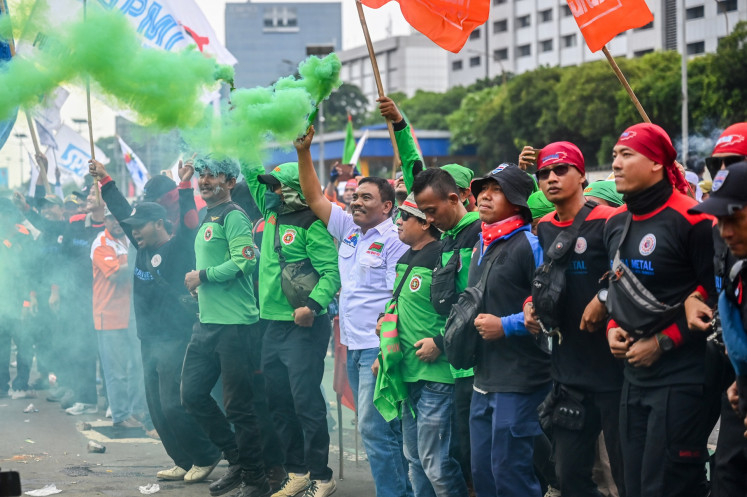Popular Reads
Top Results
Can't find what you're looking for?
View all search resultsPopular Reads
Top Results
Can't find what you're looking for?
View all search resultsSaving the Constitutional Court
As an emerging democracy, no one would deny that after 15 years of reform, the quality of our democracy and rule of law leaves a lot to be desired
Change text size
Gift Premium Articles
to Anyone
A
s an emerging democracy, no one would deny that after 15 years of reform, the quality of our democracy and rule of law leaves a lot to be desired. The Constitutional Court is crucial in determining what kind of democracy Indonesia will become, due to the gap between what the 1945 Constitution tries to achieve and what is possible given the current political maturity of various parties.
Among other things, the court made it possible for an independent candidate to run as a regional head, following the privilege given to Aceh province ' but in line with the Constitution, it ruled that presidential candidates could only be nominated by political parties.
Established in 2003, the court still needs to establish its institutional power and its legitimacy to be effective. It needs to build public confidence and gain the respect of other governmental institutions. The Constitutional Court, in its first 10 years in operation, became a success story among other Asian constitutional courts.
However after a decade, the court's legitimacy has been massively undermined by the arrest at his home of former chief justice Akil Mochtar on Oct. 3. The Corruption Eradication Commission (KPK) allegedly caught Akil red-handed receiving bribes from a legislator, believed to be in connection with a dispute over the result of a local election in Gunung Mas, Central Kalimantan.
So far the court has functioned well as a protector of constitutional rights and defender of the 1945 Constitution. However, the House of Representatives and the President have shown signs of wanting to restrain the court's influence. In 2011, the House passed amendments to the Constitutional Court Act to reduce the court's authority. Among its many provisions Articles 45A and 57(2a) were directly targeted at limiting the court's authority.
Article 45A stipulated that the Constitutional Court would no longer be allowed to issue a ruling other than on the subject requested by those who submitted the petition (ultra petita). Article 57(2a) prohibited the court from making new norms to override legislated provisions that the court considered in contravention of the Constitution.
The court struck back by declaring these articles, and others in the 2011 amendment, invalid.
The House and the President had claimed that the court had decided on cases beyond its original jurisdiction, as mandated by the Constitution. Using its judicial review authority, the court continued to decide that laws of questionable constitutionality could stand, provided they could be interpreted or applied in a way that complied with the Constitution.
Further, we saw that the court increased its authority through decisions on local election disputes. Initially the court had only determined the correct count of votes in such disputes.
However, since Nov. 2008, the court has also reviewed the quality of the election process itself with regard to candidate nomination, vote buying and abuse of power by incumbent candidates.
The court started to nullify the nomination of candidates, order vote recounts and even new elections. None of these actions fall within the court's jurisdiction under the Constitutional Court Law or Regional Autonomy Law.
Thus the court continued to behave as it had before the government tried to restrain it. The question here is how did the court become so powerful, bold and yet suffer no consequences even though it decided on cases beyond its authority?
One answer is that the court's justices understood that they existed to provide constitutional protection to citizens. Even though Soeharto's authoritarian regime had ceased to exist the new democracy, as is often the case, faced legitimacy problems with the surge of fragmented political parties. Former chief justice Mahfud MD introduced the 'substantive justice' approach, meaning the court could issue any decision as long as it was in line with the
Constitution.
A second plausible answer as to why the court acted beyond its specific jurisdiction is that its institutional legitimacy had been firmly established through public support. Since the creation of the court in 2003, the first generation of justices under Jimly Asshiddiqqie realized that they could turn to the people to win support.
So the Constitutional Court held town hall meetings, created a media center, arranged study visits and publications, to inform the general public about its existence. To attract cases to be filed at the court, the initial court appointees broadened the definition of legal standing, granting flexibility to NGOs to file judicial reviews.
The court stated that, 'every citizen as a taxpayer has the constitutional right to question every law that is closely connected with economic policy that has implications for their welfare'. Since 2003, the number of petitions increased every year.
A study conducted by Nardi (2012) cited statistics showing that the more non-governmental actors supported a petition the more likely it was that the court would deem a law unconstitutional. In the case of the 2002 electricity law, which the court annulled, the petitioners were public interest advocacy groups opposed to the privatization of the state-owned electricity company, which the petitioners claimed would increase electricity prices.
The unexpected arrest of Akil Mochtar has brought the Constitutional Court into disrepute. His alleged actions should be seen as those of an individual and not institutional corruption ' though clearly enabled by weak internal monitoring of justices' conduct.
If the House and the President's efforts in 2011 to reduce the court's authority failed, this latest development will be clearly used to further re-assess its authority.
We should not easily forget that for 10 years the court has effectively balanced political interests and our promise as a nation as stated in the 1945 Constitution, to improve the welfare and achieve equality before the law.
The writer was a previous judicial associate to the Constitutional Court, now completing his PhD at the University of New South Wales, Sydney.










